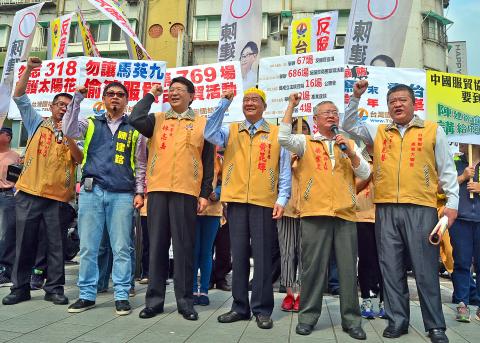There has been a transition from a wave of social movements to the formation of new political power after last year’s student-led Sunflower movement protests, as society witnesses young people actively participating in politics and their influence resounds beyond this past year, an academic said yesterday.
The administration of President Ma Ying-jeou (馬英九) has taken note of public grievances that have boiled over since the 2012 opposition to media monopolization, followed by various other movements culminating in the Sunflower movement on March 18 last year, which started as a response to the attempted forced passage of a cross-strait service trade agreement, Academia Sinica Institute of Sociology associate research fellow Wu Jieh-min (吳介民) said.
“However, Ma’s administration has not made any changes to its governance,” he said.

Photo: Wang Yi-sung, Taipei Times
Due to the Ma administration’s slow reaction to public demands suffocating society, the eruption of the 318 movement — as the Sunflower movement is also known — spurred young people into action to take back the nation’s future and lead society forward, Wu said.
The 23-day occupation of the legislative complex, including the main legislative chamber, was a test of the maturity and resilience of Taiwan’s democratic politics, as it showed the extent to which society accepted practices of civil disobedience, Wu said.
While the fact that no police force was deployed to evict protesters from the legislative floor during the siege received positive recognition, the crackdown at the Executive Yuan on March 23 last year and the ensuing judicial prosecution of protesters in ongoing trials require the public’s continuing attention, Wu said.
If Ma’s administration continues to turn a blind eye to justice and issues of concern to the younger generation, the Chinese Nationalist Party (KMT) will lose the presidential election next year in similar fashion to its rout in the Nov. 29 last year nine-in-one elections, Wu said.
In other news, Democratic Progressive Party (DPP) Chairperson Tsai Ing-wen (蔡英文) yesterday said that the Sunflower movement highlighted the fact that the nation’s politics has long suffered from “a deficiency of transparency and public participation.”
The problems that Taiwan faces are not issues of a political or ideological nature, but rather issues affecting the daily lives of people, Tsai said.
If transparency could be introduced into the political system and room made for public participation in politics, “politicians would make less mistakes,” Tsai said.
Tsai said that political parties should serve the public good and must shoulder the responsibility of carrying society forward, adding that “political parties alone cannot change society.”
The DPP will serve as an instrument to gather people from all walks of life to shape the future of the nation and face challenges ahead, she said.
Tsai, the DPP’s prospective candidate for next year’s presidential election in January, said she has been thinking about what the party’s mission is after losing the presidency to Ma in 2012.
“As the Sunflower movement demonstrated, politics is not just the business of political parties and politicians. Politics has to do with choice of values. It is how people respond to public affairs. It is something that everyone should participate in,” Tsai said.
The Sunflower movement has presented challenges for political parties, Tsai said, adding that another movement of fiercer and bigger scale would erupt if political parties fail to cope with these challenges.

Taipei has once again made it to the top 100 in Oxford Economics’ Global Cities Index 2025 report, moving up five places from last year to 60. The annual index, which was published last month, evaluated 1,000 of the most populated metropolises based on five indices — economics, human capital, quality of life, environment and governance. New York maintained its top spot this year, placing first in the economics index thanks to the strength of its vibrant financial industry and economic stability. Taipei ranked 263rd in economics, 44th in human capital, 15th in quality of life, 284th for environment and 75th in governance,

Greenpeace yesterday said that it is to appeal a decision last month by the Taipei High Administrative Court to dismiss its 2021 lawsuit against the Ministry of Economic Affairs over “loose” regulations governing major corporate electricity consumers. The climate-related lawsuit — the first of its kind in Taiwan — sought to require the government to enforce higher green energy thresholds on major corporations to reduce emissions in light of climate change and an uptick in extreme weather. The suit, filed by Greenpeace East Asia, the Environmental Jurists Association and four individual plaintiffs, was dismissed on May 8 following four years of litigation. The

A former officer in China’s People’s Liberation Army (PLA) who witnessed the aftermath of the 1989 Tiananmen Square massacre has warned that Taiwan could face a similar fate if China attempts to unify the country by force. Li Xiaoming (李曉明), who was deployed to Beijing as a junior officer during the crackdown, said Taiwanese people should study the massacre carefully, because it offers a glimpse of what Beijing is willing to do to suppress dissent. “What happened in Tiananmen Square could happen in Taiwan too,” Li told CNA in a May 22 interview, ahead of the massacre’s 36th anniversary. “If Taiwanese students or

The New Taipei City Government would assist relatives of those killed or injured in last month’s car-ramming incident in Sansia District (三峽) to secure compensation, Mayor Hou You-yi (侯友宜) said yesterday, two days after the driver died in a hospital. “The city government will do its best to help the relatives of the car crash incident seek compensation,” Hou said. The mayor also said that the city’s Legal Affairs, Education and Social Welfare departments have established a joint mechanism to “provide coordinated assistance” to victims and their families. Three people were killed and 12 injured when a car plowed into schoolchildren and their